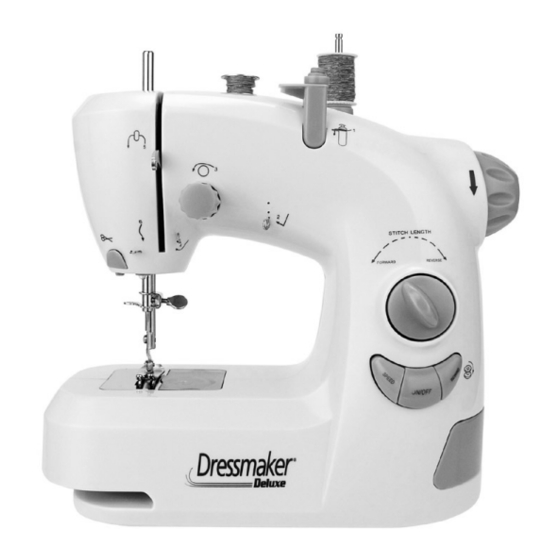Euro-Pro Dressmaker Deluxe 1104HG 소유자 매뉴얼 - 페이지 2
{카테고리_이름} Euro-Pro Dressmaker Deluxe 1104HG에 대한 소유자 매뉴얼을 온라인으로 검색하거나 PDF를 다운로드하세요. Euro-Pro Dressmaker Deluxe 1104HG 6 페이지. Euro-pro sewing machine user manual

IMPORTANT SAFETY INSTRUCTIONS
When using an electrical appliance, safety precautions should always be followed,
including the following:
Read all instructions before using this sewing machine.
Danger – To reduce the risk of
electric shock:
1. An appliance should never be left
unattended when plugged in or
with batteries in place.
2. Always unplug this appliance from
the electrical outlet and/or remove
the batteries immediately after
using and before cleaning.
Warning – To reduce the risk of
burns, fire, electric shock or injury to
persons:
1. Do not allow to be used as a toy.
Close attention is necessary when
this appliance is used by or near
children.
2. Use this appliance only for its
intended use as described in this
manual. Use only attachments
recommended by the
manufacturer as contained in this
manual.
3. Never operate this appliance if it
has a damaged cord or plug, if it is
not working properly, if it has been
dropped or damaged, or dropped
into water. Return the appliance
to EURO-PRO Operating LLC for
examination, repair, electrical or
mechanical adjustment.
4. Never operate the appliance with
any air openings blocked. Keep
ventilation openings of the sewing
machine and foot control free from
accumulation of lint, dust and
loose cloth.
5. Keep fingers away from all moving
parts. Special care is required
around the sewing machine
needle.
SAVE THESE INSTRUCTIONS
This sewing machine is intended for household use only.
6.
Always use the proper needle
plate. The wrong plate can
cause the needle to break.
7.
Do not use bent needles.
8.
Do not push or pull the fabric
while stitching. It may deflect the
needle causing it to break.
9.
Turn the sewing machine "Off"
when making any adjustments in
the needle area, such as
threading the needle, changing
the needle, threading the bobbin
or changing the presser foot.
10. Always unplug the sewing
machine from the electrical outlet
when removing covers,
lubricating or when making any
other user servicing adjustments
mentioned in the instruction
manual.
11. Never drop or insert any object
into any opening.
12. Do not use outdoors.
13. Do not operate where aerosol
(spray products) are being used
or where oxygen is being
administered.
14. To disconnect, turn all controls to
the "Off" position, then remove
the plug from the electrical outlet.
15. Do not unplug by pulling on the
power cord. To unplug, grasp
the plug, not the cord.
1
REV. 02/06A
TROUBLESHOOTING
1. The sewing machine does not run when the On/Off button is pressed to the "On"
position.
-
The batteries are inserted incorrectly. Re-insert using the diagram provided
inside the battery compartment.
-
Batteries are dead. Replace with new ones.
-
Make sure that the AC/DC adapter is connected in the right position.
2. The sewing machine runs but does not sew.
-
The machine is threaded incorrectly. Rethread the machine.
-
The needle is threaded incorrectly. Make sure that the needle is threaded from
left to right.
-
The needle is not properly inserted.
-
The batteries are installed backwards. Check the placement diagram in the
battery compartment and reinstall.
Caution: When removing fabric after sewing, first turn the hand wheel to raise the
needle to the highest position. Then lift the presser foot and remove the fabric.
This will prevent the needle from bending.
3. The sewing machine runs slowly.
-
Used and new batteries are mixed together. Replace using all new batteries.
-
Use only 4 AA batteries.
4. The sewing machine stops sewing.
-
Very heavy fabric or too many layers of fabric will force the sewing machine to
stop.
-
The thread is tangled in the lower bobbin. Stop the machine and cut the
tangled threads to clear it from the machine. Rethread both the bobbin and the
needle.
-
Poor quality stitching, refer to "Adjust Thread Tension" section.
-
The sewing machine should run approximately for two (2) hours with new
batteries under normal sewing conditions. Sewing heavy fabric requires more
power, so it will reduce the running time of the batteries.
10
